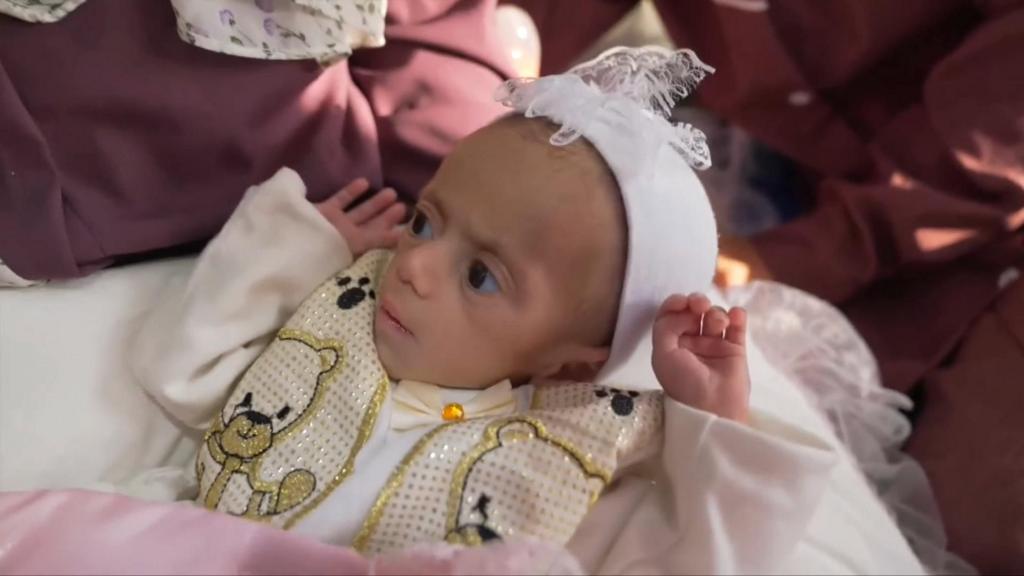Six-month-old Siwar Ashour’s faint cries were audible even before she was carried from the bus. Her voice, a testament to resilience, belonged to a child born into war, now briefly escaping its grasp.
Siwar, smaller than photographs can depict, weighed a mere 3kg (6.6lb), half her expected weight. Her mother, 23-year-old Najwa, smiled, recounting her feelings upon entering Jordan on Wednesday, after her daughter’s evacuation from Gaza with other Palestinian children. The immediate sensation? Silence.
“It feels like a truce,” she shared. “God willing, we’ll spend the night without rockets and bombs.”
Siwar was accompanied by her grandmother, Reem, and her blind father, Saleh.
“Siwar is the sole purpose of this journey,” Saleh explained. “We need to get her to safety, ensure her treatment. She’s my daughter, my blood, and I’m deeply worried.”
Reem carried Siwar from the bus onto Jordanian soil, forming a V for victory.
“I still can’t believe we’re in Jordan. Seeing King Abdullah’s photo at the border filled me with such joy; I made the victory sign… for Siwar.”
In April, the BBC documented Siwar’s condition at Nasser hospital in southern Gaza. Her mother and doctor reported severe malnutrition due to a shortage of her specialized formula. Najwa was unable to breastfeed due to her own malnutrition.
Formula donations arrived from the Jordanian Field Hospital and private fundraisers. However, the Israeli blockade, partially eased three weeks prior, and the escalating conflict highlighted the urgent need for comprehensive care.
A February agreement between King Abdullah and President Trump facilitated Jordan’s offer to treat 2000 severely ill children in Amman.
Gaza’s overwhelmed medical system struggles with the volume of sick and war-wounded. Since March, 57 children and 113 family members have been evacuated; sixteen children, including Siwar, arrived on Wednesday.
Cradled by her grandmother, Siwar gazed at the border’s gathering of police, medical personnel, and journalists. She was taken to an air-conditioned hall where Jordanian medics provided food and drinks. Peace and abundance reigned.
The parents’ and children’s exhaustion was striking. Among numerous evacuations covered, this one most powerfully conveyed collective trauma.
These families are accustomed to displacement due to Israeli evacuation orders or long queues for food. If not personally bereaved, they know those killed by the conflict.
Conflict often separates families; parents often search for food or medical care. Najwa’s trip to the hospital with Siwar marked a two-month separation from Saleh.
“I expected a short treatment, a quick return,” Saleh recalled. “But the delay shocked me… I realized her condition was incredibly serious.”
We journeyed with Siwar and her family to Amman; Najwa slept deeply, while Siwar stayed awake in her grandmother’s arms. The ambulance also carried two cancer-stricken boys, their mothers, and two younger siblings. One four-year-old cried incessantly, exhausted and frightened.
Upon reaching Amman, Siwar was transferred to a nurse’s care, then to another ambulance. In the following days, she will receive essential testing and treatment unavailable in Gaza. Her guardians will finally sleep without fear.
With additional reporting by Alice Doyard, Suha Kawar, Matthew Goddard and Malaak Hassouneh.
Their boat had been intercepted as they attempted to break Israel’s naval blockade on Gaza and deliver a symbolic amount of aid.
Asif William Rahman used top security clearance to print and circulate documents over several months.
At least 39 reportedly die in three incidents near lorries transporting flour and aid distribution sites.
The Columbia University graduate had a key role in student protests over Gaza. Trump said his arrest was the first of “many to come”.
One of the two hostages was Yair Yaakov, who was killed in the Hamas-led attack on 7 October 2023, Benjamin Netanyahu says.

